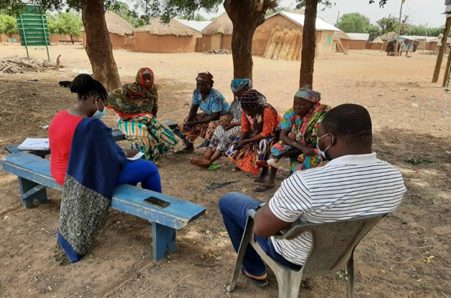The Savanna Agricultural Research Institute (SARI) of the Council for Scientific and Industrial Research (CSIR) and the Penn State University have collaborated to help women farmers at Tamalegu and Zaazi communities get access to tractor services to enhance their farming operations.
During a forum held to build the capacity of farmers in two project sites, Tamalegu and Zaazi communities, it was found that access to tractor services was a major drawback.
The objective of the forum was to identify technological needs of farmers taking part in the groundnut crop cycle project. It also seeks to look at production constraints, available technologies to mitigate the constraints, and ranking of the technological needs.
The forum was organised as part of a five-year project from the joint study between Penn State University and CSIR-SARI in Ghana. It seeks to assess women’s participation and the benefit they derive from the peanut value chain, and to develop and evaluate strategies for enhancement.
The organisers aim to use the findings to establish a Farmer Field School (FFS) in selected communities to build the capacity of women farmers and promote time-saving technologies.
The FFS will also serve as a platform for discussing key gender issues regarding access to resources (such as land, agricultural technologies, and credit), roles and feminisation of agriculture.
Speaking at the ceremony, Senior Research Scientist Dr. Edward Martey noted that the region has lots of agricultural potential due to good soil fertility that can be harnessed to grow the sector and businesses of the farmers.
“The delay in the ploughing affects the timing for seed-sowing, which subsequently results in low yields. In terms of access, women are more constrained in terms of accessing tractor services since priority is given to men,” Dr. Martey said.
Some farmers in an interview outlined challenges including the high cost of labour, lack of access to credit, lack of access to quality seed, lack of technical support, low soil fertility, lack of access to fertiliser, grain losses due to post-harvest handling, lack of access to a shelling machine, and marketing challenges regarding price.
“Demands of household activities do not allow us to weed on time, which affects our yield. The men can mobilise themselves for farm support, but it is not the same with us women. It is not possible for us to mobilise other women, given that they may be busy with other household activities” said a groundnut farmer in the Zaazi community, Zuleha Ibrahim.
To reduce the toil of farmers, CSIR-SARI in collaboration with Penn State will also be linking the farmers to tractor services and input dealers.










